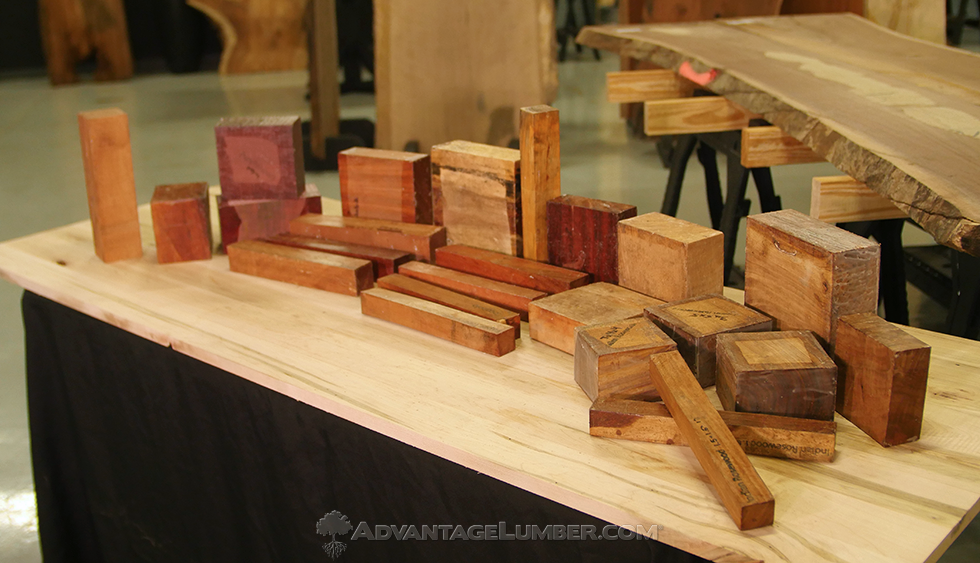Pecan Turning Blanks

Pecan Turning Blanks
Buy Online
All Turning Blanks
Shop NowPecan Specs
- Scientific Name
- Carya illinoinensis
- Common Name(s)
- Pecan
- Distribution
- South-central United States and Mexico
- Average Dried Weight
- 46 lbs/ft3 (735 kg/m3)
- Specific Gravity
- Basic: .60, 12% MC: .74
- Janka Hardness
- 1,820 lbf (8,100 N)
- Modulus of Rupture
- 13,700 lbf/in2 (94.5 MPa)
- Elastic Modulus
- 1,730,000 lbf/in2 (11.93 GPa)
- Crushing Strength
- 7,850 lbf/in2 (54.1 MPa)
- Shrinkage
- Radial: 4.9%, Tangential: 8.9%, Volumetric: 13.6%, T/R Ratio: 1.8
- Appearance
- Heartwood tends to be light to medium brown, with a reddish hue; sapwood is a paler yellowish brown.
- Texture
- Grain is usually straight, though occasionally wavy. Texture is medium, with a low natural luster. Endgrain: Ring-porous to semi-ring-porous; large to very large earlywood pores in a single intermittent row, medium to small latewood pores solitary and radial multiples of 2-3, few; tyloses common; parenchyma reticulate (bands absent from earlywood row in true hickory group, but present in pecan hickory group); narrow rays, close spacing.
- Rot Resistance
- Considered to be non-durable to perishable regarding heartwood decay, and also very susceptible to insect attack.
- Workability
- Difficult to work, with tearout being common during machining operations if cutting edges are not kept sharp; the wood tends to blunt cutting edges. Glues, stains, and finishes well. Responds well to steam bending.
- Odor
- No characteristic odor.
- Allergies/Toxicity
- Besides the standard health risks associated with any type of wood dust, no further health reactions have been associated with Pecan.
- Pricing/Availability
- Various species of Hickory and Pecan (Carya genus) are typically mixed together and simply sold as Hickory. Prices are usually in the low to mid range, depending upon local availability. Hickory prices should compare similarly to other utility hardwoods such as Red Oak or Soft Maple.
- Sustainability
- This wood species is not listed in the CITES Appendices or on the IUCN Red List of Threatened Species.
- Common Uses
- Tool handles, ladder rungs, wheel spokes, and flooring.
- Comments
- Pecan has slightly lower strength values than some of the other species of Hickory, but it is still among the hardest and strongest of woods native to the United States. The wood is commonly used where strength or shock-resistance is important. As the common name implies, Carya illinoinensis is the tree responsible for producing Pecan nuts commonly used in snacks and cooking recipes, and is the state tree of Texas. Pecan falls into the Pecan-Hickory grouping, which tends to be slightly stabler but weaker than the True-Hickories, and is considered to be a semi-ring-porous wood. The strength characteristics of Pecan are somewhat influenced by the spacing of its growth rings. In general, wood from faster-growing trees, with wider spaced growth rings, tends to be harder, heavier, and stronger than wood from slower-growing trees that have rings which are closer together. In addition to strength and hardness applications, the wood of Carya species also has a very high thermal energy content when burned, and is sometimes used as fuelwood for wood stoves. Additionally, Pecan is also used as charcoal in cooking meat, with the smoke imparting additional flavor to the food.
Pecan Turning Blank Prices

Pecan Slabs
Also Available at WoodSlabs.com
SHOP NOW »
